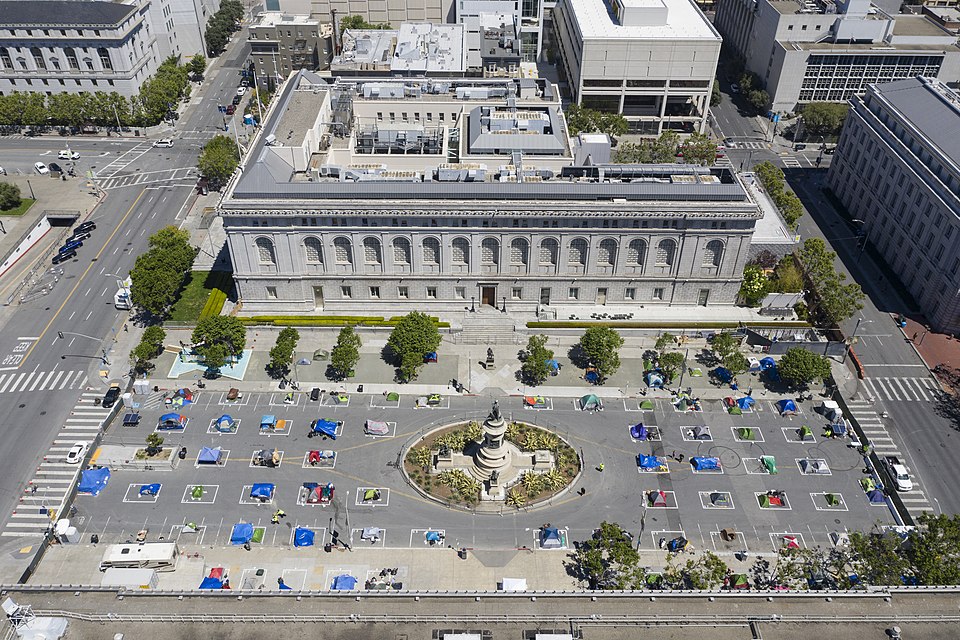Elgin Rose walks past one of the city’s designated “safe sleeping sites” in the shadow of City Hall. He chats with one of the security guards at the entrance of the fenced in encampment. He knows most people around here. Fenced in between the Main Branch of the San Francisco Public Library and the Asian Art Museum is one of the city’s largest “safe sleeping villages.” Occupants of 70 tents spaced out in painted squares have access to steady meals, electricity to charge their phones, toilets, fresh water, hand-washing stations, and showers. Rose works as a Program Manager at a small nonprofit in the Tenderloin, helping people get jobs and permanent housing.
There is no shortage of work to do these days.
Critics and advocates alike agree that the “Safe Sleeping Sites” have helped address a homeless crisis made much worse by the Covid 19 pandemic. But it has also raised questions about what will happen in the next few months. As the city starts to rapidly open up again, there is increasing pressure to close them down.
“At first, I was totally against it,” Rose said of the city’s sanctioned tent encampments. “But it got people off the sidewalks, and it gave organizations an address and access point to deliver services and resources. It also made it easier to physically find people, which with folks living on the street can be very hard to do.”
Rose has been a resident of San Francisco’s Tenderloin district for 30 years. He knows many of the people in the neighborhood and is familiar with challenges faced by people living on the streets.
He was homeless himself two years ago. Since then, he has become a leading housing advocate in San Francisco. He regularly speaks at city planning meetings and has led teams of community ambassadors through the fenced-in tent encampments to offer services and assistance.
San Francisco’s last count had 8,000 unhoused people living on our city streets. But, as reported in the Los Angeles Times, some estimates are closer to 20,000.
On March 17, 2020, the city mandated a city-wide shutdown in response to the Covid 19 pandemic. Immediately, homeless people throughout San Francisco came to the Tenderloin district to be closer to the few remaining services left open. The streets of this 41-block neighborhood became lined with tent cities, as shelters started closing because of Covid cases. The number of tents more than doubled--leading to a suit filed by UC Hastings Law School. The settlement in June of 2020 required the city to remove 300 tents from the Tenderloin and place people in hotels or "Safe Sleeping Sites."
But the creation of city-sanctioned tent sites has not been without controversy.
“It’s an admission of how shameful it is that we haven’t figured out how to get people housed,” said Dr. Margot Kushel, director of the UCSF Center for Vulnerable Populations at Zuckerberg San Francisco General Hospital. “But, this is where we are.”
While Rose says the sites have addressed a crisis made worse by the Covid pandemic, Kushel is concerned about what happens next.
“A lot of folks living on the streets are dealing with different types of trauma. They need a way to make a transition,” Rose explained while gathering materials for the Community Ambassadors, who will be delivering hygiene kits and snacks to the tent encampments. Over half the population is over 55. Many are coming out of incarceration and do not have tools to reenter society. Some have addiction issues and mental health problems. For some, having access to antidepressants can be the determining factor in getting off the streets.
The San Francisco Board of Supervisors recently debated and eventually shot down a proposal to require the city to provide shelter for all unhoused people.
Still, the Safe Sleeping Sites “got their attention,” Rose explained. “My concern is that we do not have a coordinated plan to get people to Step 2.” Rose worries that people “will simply be pushed back into the wild, where it is not safe.”
***
Josef Norris is a freelance writer who covers homelessness and mass incarceration. He also does grant writing for Code Tenderloin, a workforce development non profit






